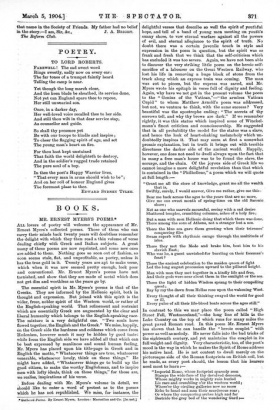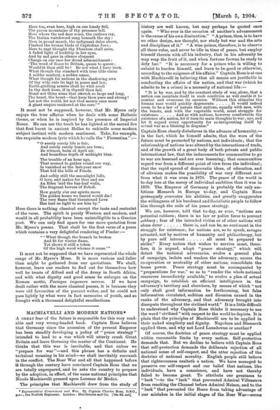BOOKS.
MR. ERNEST MYERS'S POEMS.* ALL lovers of poetry will welcome the appearance of Mr. Ernest Myers's collected poems. Those of them who can carry their minds back twenty years will doubtless remember the delight with which they then read a thin volume of verse dealing chiefly with Greek and Italian subjects. A great many of these poems are now reprinted, and some new ones are added to them. Nothing goes so soon out of fashion, so soon seems stale, flat, and unprofitable, as poetry, unless it has the true gold in it. Twenty years are apt to make verse, which when it was new seemed pretty enough, look poor and conventional. Mr. Ernest Myers's poems have not tarnished, and show that they are made of metal which does not get dim and worthless as the years go by.
The essential spirit in Mr. Myers's poems is that of the Greeks. They are informed by the Hellenic spirit, both in thought and expression. But joined with this spirit is the -wider, freer, nobler spirit of the Western world, or rather of the English-speaking world. That refinement and restraint which are essentially Greek are augmented by the clear and liberal humanity which belongs to the English-speaking race. The mixture is a very delightful one. "Two souls have flowed together, the English and the Greek." We miss, happily, on the Greek side the hardness and coldness which come from Hedonism, however much it may be hidden by good taste; while from the English side we have added all that which can be best expressed by manliness and sound human feeling. Mr. Myers has placed upon his title-page in Greek and in English the motto, "Whatsoever things are true, whatsoever venerable, whatsoever lovely, think on these things." He might have added, "Whatsoever things go to build up the good citizen, to make the worthy Englishman, and to inspire men with lofty ideals, think on these things," for these are, we realise, inspirations of his verse.
Before dealing with Mr. Myers's volume in detail, we should like to enter a word of protest as to the poems -which he has not republished. We miss, for instance, the • Gatheerd Poems. By Ernest Myers. London : Macmillan and Co. [5s. net.]
delightful verses that describe so well the spirit of youthful hope, and tell of a band of young men meeting on youth's sunny shore, to vow eternal warfare against all the powers of evil, and eternal allegiance to the spirit of truth. No doubt there was a certain juvenile touch in style and expression in the poem in question, but the spirit was so frank and fresh that we think that the self-criticism which has excluded it was too severe. Again, we have not been able to discover the very striking little poem on the heroic self- sacrifice of a labourer on the Great Western Railway, who lost his life in removing a huge block of stone from the track along which an express train was coming. The man was cut to pieces, but the express was saved, and Mr. Myers wrote his epitaph in verse full of dignity and feeling.
Again, why have we not got in the present volume the poem to the "Genius of the Vatican,"—" the armless Vatican Cupid" to whom Matthew Arnold's poem was addressed, but not, we venture to think, with the same success ? Very beautiful was the apostrophe ending : "The secrets of thy sorrows tell, and why thy brows are dark." If we remember rightly, it was this statue which inspired some of Winckel- mann's finest criticism and connoisseurship. He suggested that in all probability the model for the statue was a slave, and hence the look of heart-shaking melancholy which un- doubtedly inspires it. That may seem at first a somewhat prosaic explanation, but in truth it brings out with terrible directness the darker side of the ancient world. Happily, however, one does not need to dwell always upon the fact that in many a free man's house was to be found the slave, the scourge, and the chain. Of the joyous side of Greek life we cannot imagine a more delightful revelation than that which is contained in the "Philhellene," a poem which we will quote at full length :—
"Grant me all the store of knowledge, grant me all the wealth that is,
Swiftly, surely, I would answer, Give me rather, give ins this :
Bear me back across the ages to the years that are no more, Give me one sweet month of spring-time on the old Saronic shore ;
Not as one who marvels mournful, seeing with a sad desire Shattered temples, crumbling columns, ashes of a holy fire ; But a man with men Hellenic doing that which there was done, There among the sons of Athens, not a stranger but a son.
There the blue sea gave them greeting when their triremes' conquering files Swam superb with rhythmic oarage through the multitude of isles.
There they met the Mode and brake him, beat him to his slavish East; Who was he, a guest unwished-for bursting on their freeman's feast ?
There the ancient celebration to the maiden queen of fight Led the long august procession upward to the pillared height.
Man with man they met together in a kindly life and free, And their gods were near about them in the sunlight or the sea.
There the light of hidden Wisdom sprang to their compelling quest ; Ray by ray the dawn from Hellas rose upon the wakening West.
Every thought of all their thinking swayed the world for good or ill, Every pulse of all their life-blood beats across the ages still."
In contrast to this we may place the poem called "High Street Fell, Westmoreland,"—the long line of hills in the Lake Country on the top of which runs for many miles the great paved Roman road. In this poem Mr. Ernest Myers
has shown that he can handle the "heroic couplet" with power as well as melody. He never falls into the bad tricks of the eighteenth century, and yet maintains the couplet in its full weight and dignity. Very characteristic, too, of the poet's mood is the way in which be makes the Spirit of Rome address his native land. He is not content to dwell merely on the picturesque side of the Roman footprints on British soil, but he reads, as every poet should, the lesson that his hearers need most to learn :-
"Imperial Rome, whose footprint sparsely seen Stamps the wide face of thy devolved demesne, Whose mighty works in mighty ruin hurled Lie rare and crumbling o'er the western world ; Where'er thy circling galleries now no more Echo to beast and man their murderous roar ; Or where thy conquering arches high and far
. Bestride the grey bed of the wondering Gard r- Here too, even here, high on our lonely fell, The paven mountains of thy presence tell.
Here where the red deer roam, the curlews cry, The Italian watchword rang beneath the sky : Here in proud march, the indignant dales above, Flashed the bronze birds of Capitolian Jove ; Here to rapt thought thy Phantom shall arise, A faded light of lordship in her eyes, And by sad gaze in silence eloquent Charge on our race her dread admonishment : 'The word of Rome to Britain, queen to queen ; Would'st thou still be? Be not what I have been.
What though thy standard with true title claim A. milder mastery, a nobler name, What though far nations in the shadowing awe Of thy wide rule lie lapt in peace and law, Earth-girdling armies shall no whit avail In thy dark hour, if in thyself thou fail.
Boast not thine arms that stretch so large and long, The heart, the heart—that keep thou pure and strong !
Let not the world, let not God mourn once more A giant empire cankered at the eore.' "
It must not be supposed, however, that Mr. Myers only enjoys the true afflatus when he deals with some Hellenic theme, or when he is inspired by the presence of Imperial Rome. He can use the torch he has lighted at the sacred fire that first burnt in ancient Hellas to enkindle some modern subject instinct with modern sentiment. Take, for example, the exquisite modern lyric which he calls the " Fiorentino." :— " 0 surely surely life is fair,
And surely surely hearts are true; Be witness, balm of April air, And boundless depth of midnight blue.
The trouble of an hour ago, That seemed to gather round our way, Is vanished as the last-year snow That hid the hills of Fesole.
And softly still the moonlight falls, 0 love, and makes for thee and me An Eden 'mid the bay-leaf walls, The fragrant bowers of Boboli.
How gently o'er our spirits move The golden hours we feared would die! The very flame that threatened Love Has lent us light to see him by."
Here there is nothing classical except the taste and restraint of the verse. The spirit is purely Western and modern, and would in all probability have been unintelligible to a Grecian poet. We can only find space for one more quotation from Mr. Myers's poems. That shall be the first verse of a poem which contains a very delightful rendering of Pindar :—
" What though the branch be broken And fit for winter flame, Yet shows it still a token Of the high wood whence it came."
It must not be supposed that we have represented the whole range of Mr. Myers's Muse. It is more various and fuller than might be gathered from our quotations. We shall,
however, leave our readers to find out for themselves how well he treats of Alfred and of the Army in South Africa, and with what dignity and good sense he enlarges on the Roman motto, Pacisque imponere moron. If we have dealt rather with the more classical poems, it is because they were old favourites of the present writer, and he could not pass lightly by what were in fact memories of youth, and so fraught with a thousand delightful recollections.











































 Previous page
Previous page